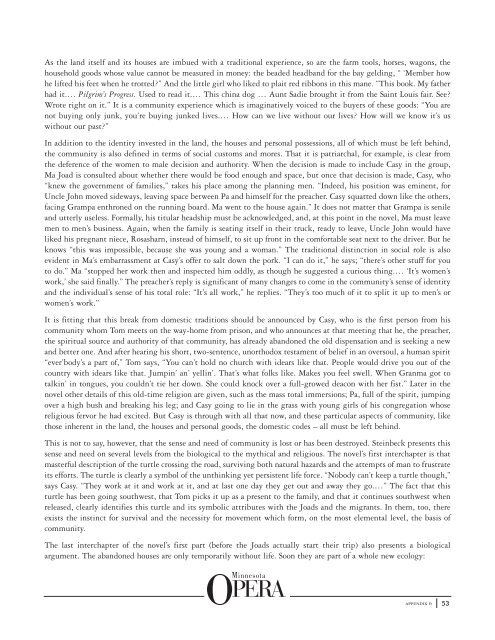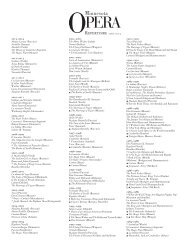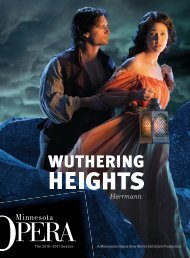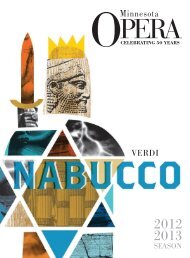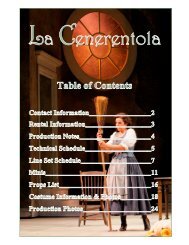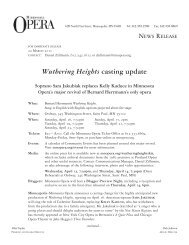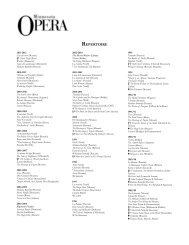You also want an ePaper? Increase the reach of your titles
YUMPU automatically turns print PDFs into web optimized ePapers that Google loves.
As the land itself and its houses are imbued with a traditional experience, so are the farm tools, horses, wagons, the<br />
household goods whose value cannot be measured in money: the beaded headband for the bay gelding, “ ‘Member how<br />
he lifted his feet when he trotted?” And the little girl who liked to plait red ribbons in this mane. “This book. My father<br />
had it.… Pilgrim’s Progress. Used to read it.… This china dog … Aunt Sadie brought it from the Saint Louis fair. See?<br />
Wrote right on it.” It is a community experience which is imaginatively voiced to the buyers of these goods: “You are<br />
not buying only junk, you’re buying junked lives.… How can we live without our lives? How will we know it’s us<br />
without our past?”<br />
In addition to the identity invested in the land, the houses and personal possessions, all of which must be left behind,<br />
the community is also defined in terms of social customs and mores. That it is patriarchal, for example, is clear from<br />
the deference of the women to male decision and authority. When the decision is made to include Casy in the group,<br />
Ma Joad is consulted about whether there would be food enough and space, but once that decision is made, Casy, who<br />
“knew the government of families,” takes his place among the planning men. “Indeed, his position was eminent, for<br />
Uncle John moved sideways, leaving space between Pa and himself for the preacher. Casy squatted down like the others,<br />
facing Grampa enthroned on the running board. Ma went to the house again.” It does not matter that Grampa is senile<br />
and utterly useless. Formally, his titular headship must be acknowledged, and, at this point in the novel, Ma must leave<br />
men to men’s business. Again, when the family is seating itself in their truck, ready to leave, Uncle John would have<br />
liked his pregnant niece, Rosasharn, instead of himself, to sit up front in the comfortable seat next to the driver. But he<br />
knows “this was impossible, because she was young and a woman.” The traditional distinction in social role is also<br />
evident in Ma’s embarrassment at Casy’s offer to salt down the pork. “I can do it,” he says; “there’s other stuff for you<br />
to do.” Ma “stopped her work then and inspected him oddly, as though he suggested a curious thing.… ‘It’s women’s<br />
work,’ she said finally.” The preacher’s reply is significant of many changes to come in the community’s sense of identity<br />
and the individual’s sense of his total role: “It’s all work,” he replies. “They’s too much of it to split it up to men’s or<br />
women’s work.”<br />
It is fitting that this break from domestic traditions should be announced by Casy, who is the first person from his<br />
community whom Tom meets on the way-home from prison, and who announces at that meeting that he, the preacher,<br />
the spiritual source and authority of that community, has already abandoned the old dispensation and is seeking a new<br />
and better one. And after hearing his short, two-sentence, unorthodox testament of belief in an oversoul, a human spirit<br />
“ever’body’s a part of,” Tom says, “You can’t hold no church with idears like that. People would drive you out of the<br />
country with idears like that. Jumpin’ an’ yellin’. That’s what folks like. Makes you feel swell. When Granma got to<br />
talkin’ in tongues, you couldn’t tie her down. She could knock over a full-growed deacon with her fist.” Later in the<br />
novel other details of this old-time religion are given, such as the mass total immersions; Pa, full of the spirit, jumping<br />
over a high bush and breaking his leg; and Casy going to lie in the grass with young girls of his congregation whose<br />
religious fervor he had excited. But Casy is through with all that now, and these particular aspects of community, like<br />
those inherent in the land, the houses and personal goods, the domestic codes – all must be left behind.<br />
This is not to say, however, that the sense and need of community is lost or has been destroyed. Steinbeck presents this<br />
sense and need on several levels from the biological to the mythical and religious. The novel’s first interchapter is that<br />
masterful description of the turtle crossing the road, surviving both natural hazards and the attempts of man to frustrate<br />
its efforts. The turtle is clearly a symbol of the unthinking yet persistent life force. “Nobody can’t keep a turtle though,”<br />
says Casy. “They work at it and work at it, and at last one day they get out and away they go.…” The fact that this<br />
turtle has been going southwest, that Tom picks it up as a present to the family, and that it continues southwest when<br />
released, clearly identifies this turtle and its symbolic attributes with the Joads and the migrants. In them, too, there<br />
exists the instinct for survival and the necessity for movement which form, on the most elemental level, the basis of<br />
community.<br />
The last interchapter of the novel’s first part (before the Joads actually start their trip) also presents a biological<br />
argument. The abandoned houses are only temporarily without life. Soon they are part of a whole new ecology:<br />
appendix b<br />
53


